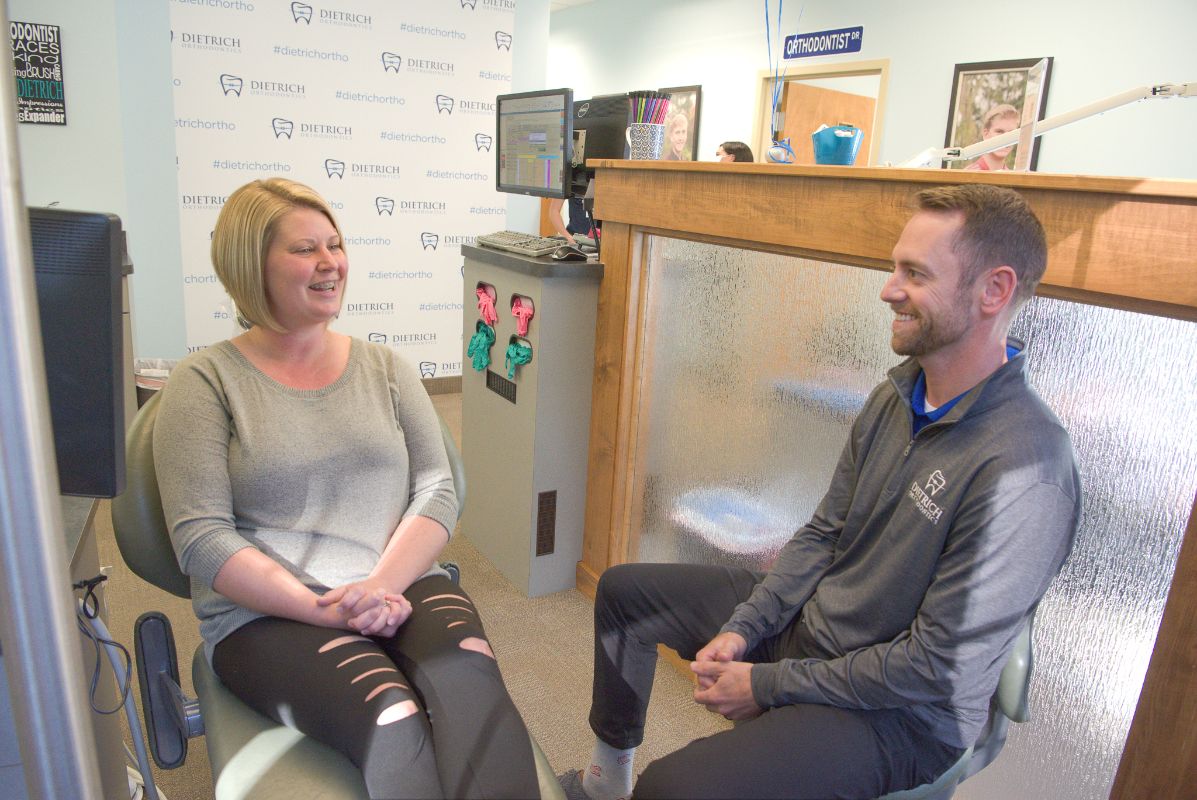Did you have a perfect smile in high school or college after completing orthodontic treatment? Does it still look the same today, or have your teeth begun shifting back towards their old positions? If you don’t love the smile you see in the mirror anymore, you’re not alone!
Here at Dietrich Orthodontics, we regularly see adult patients experiencing what we call an orthodontic relapse. The smile they spent so much time straightening has begun to shift, and they want to know if there’s anything we can do to get it back on track again.
Fortunately, there is! Dr. Dietrich has years of experience working with orthodontic patients of all ages, including adults who need touch-up treatment to correct a relapse. Let’s look at what can cause an orthodontic relapse, why you should treat this condition, and what we can do to give you a smile you can’t wait to show off again!
What is an orthodontic relapse?
The term “orthodontic relapse” is used to describe the tendency of the teeth to return to the original positions they were in before orthodontic treatment. Short-term relapse happens less than one year after the completion of treatment. Long-term relapse occurs more than a year after finishing treatment.
Orthodontic relapse is pretty common. Some studies estimate that more than 50% of patients will experience relapse within ten years of completing their treatment. This chance for relapse is one reason orthodontists have changed their approach to retainer wear in recent years. Many adults dealing with relapse were told during their orthodontic treatment as teens that they could stop wearing their retainers after a year or two. Now orthodontists agree that you should wear your retainers for life!
Don’t let that kind of commitment scare you off, though! After the first two years with your retainers, you’ll only need to wear them at night. This will be enough to stabilize your newly straightened smile and help keep your teeth in their optimal positions.
What causes an orthodontic relapse?
Not using a retainer as directed by an orthodontist is the most common reason for teeth shifting after orthodontic treatment. Many patients underestimate the importance of retainers, especially once time has passed, but treatment doesn’t stop once your braces come off!
After the initial phase of treatment is complete, the teeth and surrounding bone and gums still need time to solidify in their new locations. Wearing your retainers as directed by Dr. Dietrich will help protect your teeth from the forces trying to pull them back to their previous positions and assist with the stabilization effort over time.
While irregular retainer use is the biggest reason we see relapses, there can be other contributing factors for them as well. These include, but are not limited to:
Genetics and natural aging
Genetics can give you a beautiful smile to work with, but you still may experience some natural teeth shifting as you grow older. This is a common occurrence because, regardless of your previous treatment, the back teeth tend to shift forward over time, reducing the amount of space available for the front teeth, which get crowded out of the arch alignment.
Teeth grinding
Chronic tooth grinders will already know the damage it can cause, but the continuous force places a strain on teeth that can alter the bite and result in misalignment.
Tooth loss
If you’ve lost one or more teeth due to trauma, decay, or periodontal disease, the teeth surrounding that space will often begin to drift towards it over time. If this is left uncorrected, it can eventually lead to misalignment of the teeth and the bite.
How do you treat orthodontic relapses?
It can be upsetting to see your teeth shifting for any reason, but our expert team is here to help! There are generally a few different options for addressing an orthodontic relapse.
Retreatment
If you’ve suffered relapse, we may recommend retreatment with braces or aligners. As an adult, you might balk at dealing with traditional braces again, but we’re able to offer a variety of treatment options to correct your relapse. These include discreet options like clear braces.
What are the benefits of retreatment?
The thought of retreatment can feel overwhelming, but there are good reasons for addressing your orthodontic relapse! First and foremost is improved oral health. Crowded teeth create crevices where food particles accumulate, leading to plaque and tartar buildup. Teeth correctly spaced and aligned are easier to keep clean with an excellent dental hygiene routine.
Retreatment can also give you back the beautifully aligned smile you once had! This can help you feel more confident in your daily life and improve your overall self-esteem. The good news is that correcting a relapse often takes much less time than your initial treatment. The results will be more than worth it when you recognize your smile in the mirror again.
Get your smile back on track with Dietrich Orthodontics
Whatever the reason for your orthodontic relapse, we can recreate the smile you’ve been missing and improve your oral health. If you’re ready to take the first step towards reclaiming your beautiful smile, get in touch with us today to schedule a consultation with our offices in Canton or Alliance!


